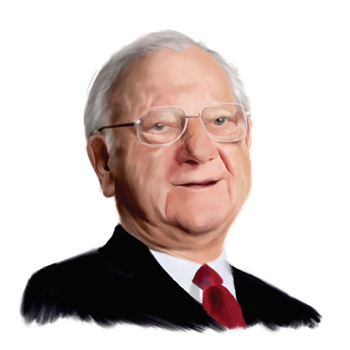
Illustration by Jenny Campbell
Shortly after his 90th birthday, Robert E. Cooley delivered a guest lecture entitled “Household Archaeology: My Career Lies in Ruins” on the Charlotte, N.C., campus of Gordon-Conwell Theological Seminary. He had played with that pun for years, but there he demonstrated more than his wit. He provided the key to the formative influence biblical archaeology had on his own leadership in theological education. Jeremiah’s prophecy (3:15 RSV) applies: “I will give you shepherds after my own heart, who will feed you with wisdom and understanding.” Bob was a shepherd with timely gifts of the Spirit.
The ordained son of an Assemblies of God pastor, he studied first at Central Bible College and then transferred to Wheaton College to pursue his passion for biblical archaeology. A doctorate at New York University in Semitic languages and Near Eastern archaeology with additional explorations in ancient architecture and anthropology primed him for the significant contributions he would make to his field.
He led digs to several ancient Canaanite and Hebrew communities in Egyptian, Palestinian, and Israeli locations, correlating his findings with the book of Judges and 1 Samuel and with the Gospels for the Galilean hill country. In the placement of building stones, pottery, bones, and other artifacts, he discerned how families were defined by community and how family social solidarity extended from life into death. He unearthed Hebrew unfaithfulness when home altars to Baal were revealed, and Hebrew faithfulness by contrasting theirs with Canaanite burial practices. He recognized how the location of Israel on land bridging Mesopotamia and Egypt positioned it to be a light to the nations.
In Jesus and the Apostles, he witnessed the transformation of the Hebrew household of God into a spiritual family that included Jews and Gentiles, and as an Evangelical he grew as an ecumenist with connections beyond his own fold and as a respected leader in interfaith settings. His gift for friendship, enhanced by a phenomenal memory, became legendary among those whom he came to know. Besides his family, the delight of his life was to lead pilgrimages to the Holy Land.
In that November lecture he revealed why he had come to focus on the health of various institutions in God’s household and how they had to be understood within their distinctive communal and cultural settings. His home base from 1981 to 1997 was the presidency at Gordon-Conwell in South Hamilton, Mass., where he built on the founding work of his predecessor in this growing but relatively young, merged institution. This school gave him much to ponder. He developed a clear sense of how leadership and authority had to be directed toward achieving balance, always precarious, through a system of governance shared by the office of the president, the faculty, and the governing board dependent upon well-defined roles, service to students, and access to economic support.
His effectiveness at communicating and adapting these ideas led to his selection for leadership elsewhere, including as president of the Association of Theological Schools, and as board chairman for World Relief, for the World Evangelical Alliance, and for others, including the In Trust Center, where he served as board chair.
Bob was known for his honesty. He became the go-to mentor on consolidations and mergers at several institutions and openly acknowledged the high rate of failure among many who tried. He was renowned as a troubleshooter and assisted with the recovery of Oral Roberts University during its financial downslide. He advised leaders at several seminaries and was a driving force behind the founding and development of the remarkable Museum of the Bible in Washington, D.C.
Bob also understood the loneliness and sense of betrayal often experienced by presidents and chief executive officers and willingly shepherded them. He broke down challenges into charts, maps, points, and steps. The future was always in his sights as he considered emerging technologies, methods of teaching and learning, and institutional forms, while also understanding the communal origins of past practices.
Bob Cooley was an invaluable friend and mentor for those who base their vocation on the Great Commission.
His faith enabled him to speak openly about his own grief over the recent loss of Eileen, his wife of 66 years, as he had of the tragic death of their oldest son in a skiing accident. Bob was a deeply loving Christian – a true gift on loan to us. Imagine him even now, goading us forward, as in his own final days he listed the necessary steps to start a School for Shepherds at a site along the Sea of Galilee. May we find similar joy in our own callings, and may he rest in peace.
Christa R. Klein, Ph.D., In Trust Center president emerita, is grateful for her 35-year friendship with Dr. Cooley. They began working together when she was a consultant on theological school governance for the Religion Division of Lilly Endowment, Inc.